| Listing 1 - 10 of 14 | << page >> |
Sort by
|
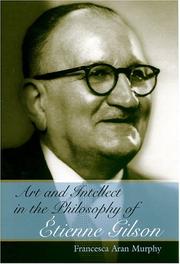
ISBN: 082621536X 9780826215369 0826262384 9780826262387 Year: 2004 Publisher: Columbia University of Missouri Press
Abstract | Keywords | Export | Availability | Bookmark
 Loading...
Loading...Choose an application
- Reference Manager
- EndNote
- RefWorks (Direct export to RefWorks)
Philosophers --- Gilson, Etienne, --- Gilson, E. --- Gilson, Étienne Henry, --- Gilson, Stefan, --- Philosophers - France - Biography. --- Gilson, Etienne, - 1884-1978.
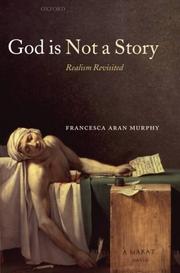
ISBN: 9780199219285 Year: 2007 Publisher: New York Oxford University Press
Abstract | Keywords | Export | Availability | Bookmark
 Loading...
Loading...Choose an application
- Reference Manager
- EndNote
- RefWorks (Direct export to RefWorks)
Book
ISBN: 9780567696984 0567696987 9780567680525 9780567680556 9780567680518 Year: 2022 Publisher: London T&T Clark
Abstract | Keywords | Export | Availability | Bookmark
 Loading...
Loading...Choose an application
- Reference Manager
- EndNote
- RefWorks (Direct export to RefWorks)
"This book provides a creative and highly imaginative critical theological genealogy of modern secular reason and the nature of modernity more generally. Francesca Murphy offers a critical perspective that shapes the exploration of modernity, driven by Catholic traditions and sources. Murphy's method is unique: she uses artificial intelligence as her framing parable, analyzing the nature and limits of the robotic 'reasoning' of several AI characters (Pistis, Gnosis and Cultus). This enables her to develop several interrelated themes, with further didactic chapters offering a mytho-poetic retelling of human history. Her reflections on the absence of creativity and any meaningful relation to 'time' further renders an acute critique of the limits of technological rationality. The end result is an unusual and compelling exploration of rationality and fundamental theological anthropology"--
Theological anthropology --- Civilization, Modern --- Robots --- Philosophy, Modern --- Christianity
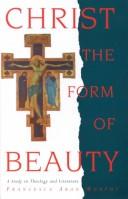
ISBN: 0567097080 Year: 1995 Publisher: Edinburgh Clark
Abstract | Keywords | Export | Availability | Bookmark
 Loading...
Loading...Choose an application
- Reference Manager
- EndNote
- RefWorks (Direct export to RefWorks)
Aesthetics --- Agrarians (Group of writers) --- Religious aspects --- Christianity --- Jesus Christ --- von Balthasar, Hans Urs --- History of doctrines
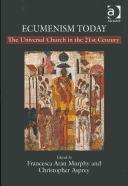
ISBN: 9780754659617 Year: 2008 Publisher: Aldershot Ashgate
Abstract | Keywords | Export | Availability | Bookmark
 Loading...
Loading...Choose an application
- Reference Manager
- EndNote
- RefWorks (Direct export to RefWorks)
Christian union --- Church --- Ecumenical movement --- Unity
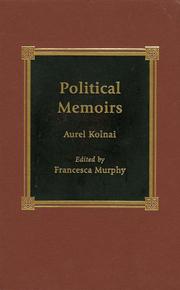
ISBN: 0739100653 Year: 1999 Publisher: Lanham Lexington books
Abstract | Keywords | Export | Availability | Bookmark
 Loading...
Loading...Choose an application
- Reference Manager
- EndNote
- RefWorks (Direct export to RefWorks)
Christianity and politics --- Political ethics --- State, The --- World politics --- Kolnai, Aurel.
Book
ISBN: 9780198800644 9780199641911 0198800649 Year: 2018 Publisher: Oxford: Oxford university press,
Abstract | Keywords | Export | Availability | Bookmark
 Loading...
Loading...Choose an application
- Reference Manager
- EndNote
- RefWorks (Direct export to RefWorks)
The Oxford Handbook of Christology brings together 40 authoritative essays considering the theological study of the nature and role of Jesus Christ. This collection offers dynamic perspectives within the study of Christology and provides rigorous discussion of inter-confessional theology, which would not have been possible even 60 years ago. The first of the seven parts considers Jesus Christ in the Bible. Rather than focusing solely on the New Testament, this section begins with discussion of the modes of God's self-communication to us and suggests that Christ's most original incarnation is in the language of the Hebrew Bible. The second section considers Patristics Christology. These essays explore the formation of the doctrines of the person of Christ and the atonement between the First Council of Nicaea in 325 and the eve of the Second Council of Nicaea. The next section looks at Mediaeval theology and tackles the development of the understanding of who Christ was and of his atoning work. The section on 'Reformation and Christology' traces the path of the Reformation from Luther to Bultmann. The fifth section tackles the new developments in thinking about Christ which have emerged in the modern and the postmodern eras, and the sixth section explains how beliefs about Jesus have affected music, poetry, and the arts. The final part concludes by locating Christology within systematic theology, asking how it relates to Christian belief as a whole. This comprehensive volume provides an invaluable resource and reference for scholars, students, and general readers interested in the study of Christology.
Book
ISBN: 9780198795353 0198795351 0192514660 Year: 2021 Publisher: New York: Oxford University Press,
Abstract | Keywords | Export | Availability | Bookmark
 Loading...
Loading...Choose an application
- Reference Manager
- EndNote
- RefWorks (Direct export to RefWorks)
In this volume we have followed our important predecessors that produced overviews of the notion of divine revelation during the past decades. We have chosen the multidisciplinary way as an attempt to explain what divine revelation can mean in our time. The underlying idea is that the proper understanding of God's revelation can be given in the systemic way. The main parts of this work-the biblical, theological, philosophical, historical, scientific and cultural approaches-offer possibilities to perceive, conceive and assess divine disclosure. There are chapters dealing with the Biblical background of revelation; there are others that explain the delicate relationship between the Christian understanding of the fulfillment of revelation in Christ and the original revelation given to Moses, Abraham, and to the created whole in the act of creation. Other chapters explore the theological aspects of revelation beginning with the Trinitarian problematic to the realm of charismatic forms of revelation, including the Marian apparitions as unique examples of the reality of revelation in our days. The philosophical explorations of the problem of revelation show the importance of philosophical reflections on revelation today or on a historical scale. A radical understanding of revelation is the ultimate horizon of the reality of divine revelation, a horizon which connects philosophical, theological, Biblical and comparative approaches. Revelation-related forms in Hinduism, Buddhism, the Chinese tradition or African religions contribute to the better understanding of the important role of divine revelation in connecting cultures and religions around the globe. The notion of revelation in Judaism and Islam has the paramount role in any comparative understanding, which needs to be extended to the importance of our conceptions of revelation in view of European history, especially the Holocaust. This event appears a watershed in our contemporary reflections on revelation, because it triggered radical rethinking, reassessment and revaluation of traditional theological and philosophical conceptions.
Revelation --- God --- Inspiration --- Supernatural --- 230.111 --- 230.111 Geloof in een goddelijke openbaring --- Geloof in een goddelijke openbaring
Book
ISBN: 9780199641901 0199641900 Year: 2015 Publisher: Oxford Oxford University Press
Abstract | Keywords | Export | Availability | Bookmark
 Loading...
Loading...Choose an application
- Reference Manager
- EndNote
- RefWorks (Direct export to RefWorks)
Book
ISBN: 9780567033406 9780567033413 Year: 2009 Publisher: London Clark
Abstract | Keywords | Export | Availability | Bookmark
 Loading...
Loading...Choose an application
- Reference Manager
- EndNote
- RefWorks (Direct export to RefWorks)
| Listing 1 - 10 of 14 | << page >> |
Sort by
|

 Search
Search Feedback
Feedback About UniCat
About UniCat  Help
Help News
News